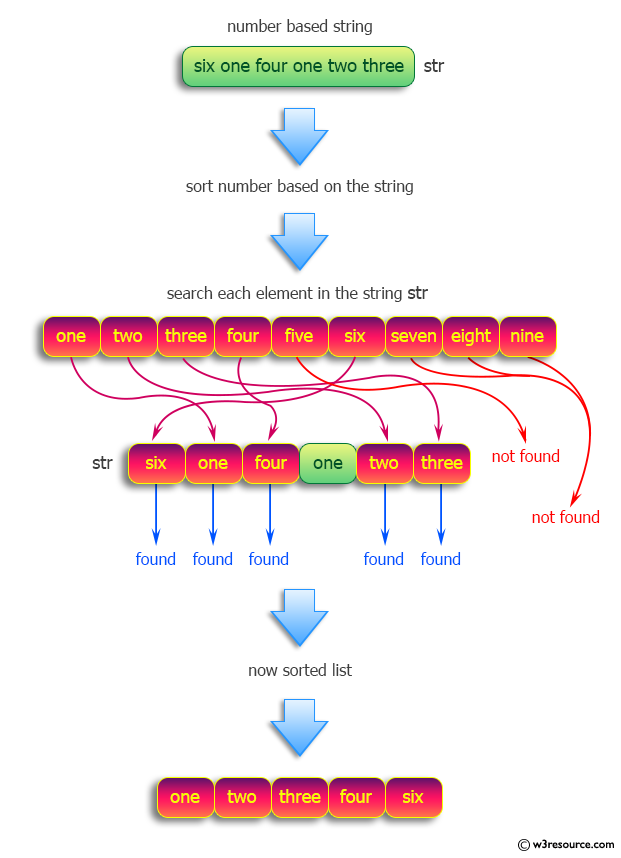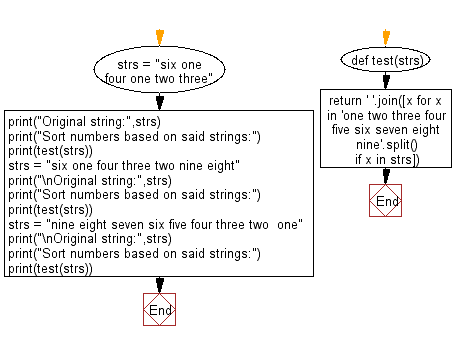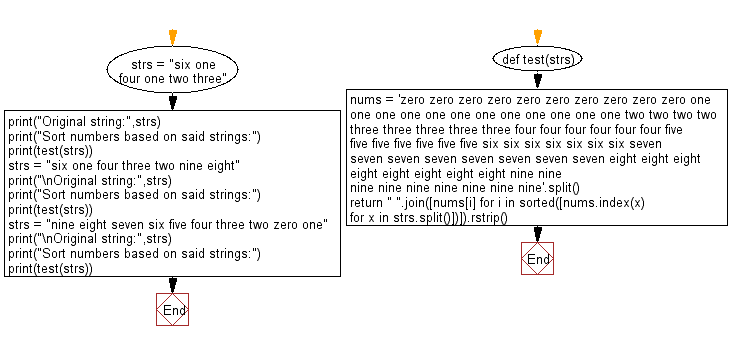Python: Sort numbers based on strings
Sort Numbers from Words
Write a Python program to sort numbers based on strings.
Input: six one four one two three Output: one two three four six Input: six one four three two nine eight Output: one two three four six eight nine Input: nine eight seven six five four three two one Output: one two three four five six seven eight nine
Visual Presentation:

Sample Solution-1:
Python Code:
# License: https://bit.ly/3oLErEI
# Define a function named 'test' that takes a string 'strs' as input
def test(strs):
# Split the string of words into a list and filter only those present in the predefined list
selected_numbers = [x for x in 'one two three four five six seven eight nine'.split() if x in strs]
# Join the selected numbers into a string with spaces in between
result = ' '.join(selected_numbers)
# Return the final string
return result
# Assign a specific string 'strs' to the variable
strs = "six one four one two three"
# Print a message indicating the original string
print("Original string:", strs)
# Print a message indicating the operation to be performed
print("Sort numbers based on said strings:")
# Print the result of the test function applied to 'strs'
print(test(strs))
# Assign another specific string 'strs' to the variable
strs = "six one four three two nine eight"
# Print a message indicating the original string
print("\nOriginal string:", strs)
# Print a message indicating the operation to be performed
print("Sort numbers based on said strings:")
# Print the result of the test function applied to 'strs'
print(test(strs))
# Assign another specific string 'strs' to the variable
strs = "nine eight seven six five four three two one"
# Print a message indicating the original string
print("\nOriginal string:", strs)
# Print a message indicating the operation to be performed
print("Sort numbers based on said strings:")
# Print the result of the test function applied to 'strs'
print(test(strs))
Sample Output:
Original string: six one four one two three Sort numbers based on said strings: one two three four six Original string: six one four three two nine eight Sort numbers based on said strings: one two three four six eight nine Original string: nine eight seven six five four three two one Sort numbers based on said strings: one two three four five six seven eight nine
Flowchart:

Sample Solution-2:
Python Code:
# License: https://bit.ly/3oLErEI
# Define a function named 'test' that takes a string 'strs' as input
def test(strs):
# Define a list of words representing numbers from zero to nine, repeated multiple times
nums = 'zero zero zero zero zero zero zero zero zero zero one one one one one one one one one one one one two two two two three three three three three four four four four four four five five five five five five five six six six six six six six seven seven seven seven seven seven seven seven eight eight eight eight eight eight eight eight nine nine nine nine nine nine nine nine nine'.split()
# Split the input string into a list of words and map the indices of the numbers to the corresponding words
sorted_indices = sorted([nums.index(x) for x in strs.split()])
# Create a new list by selecting numbers from the predefined list based on the sorted indices
sorted_numbers = [nums[i] for i in sorted_indices]
# Join the sorted numbers into a string with spaces in between and remove trailing whitespaces
result = " ".join(sorted_numbers).rstrip()
# Return the final string
return result
# Assign a specific string 'strs' to the variable
strs = "six one four one two three"
# Print a message indicating the original string
print("Original string:", strs)
# Print a message indicating the operation to be performed
print("Sort numbers based on said strings:")
# Print the result of the test function applied to 'strs'
print(test(strs))
# Assign another specific string 'strs' to the variable
strs = "six one four three two nine eight"
# Print a message indicating the original string
print("\nOriginal string:", strs)
# Print a message indicating the operation to be performed
print("Sort numbers based on said strings:")
# Print the result of the test function applied to 'strs'
print(test(strs))
# Assign another specific string 'strs' to the variable
strs = "nine eight seven six five four three two zero one"
# Print a message indicating the original string
print("\nOriginal string:", strs)
# Print a message indicating the operation to be performed
print("Sort numbers based on said strings:")
# Print the result of the test function applied to 'strs'
print(test(strs))
Sample Output:
Original string: six one four one two three Sort numbers based on said strings: one one two three four six Original string: six one four three two nine eight Sort numbers based on said strings: one two three four six eight nine Original string: nine eight seven six five four three two zero one Sort numbers based on said strings: zero one two three four five six seven eight nine
Flowchart:

For more Practice: Solve these Related Problems:
- Write a Python program to extract numerical words from a sentence and sort them based on their numeric value.
- Write a Python program to map words representing numbers to their integer equivalents and then sort the original words accordingly.
- Write a Python program to sort a list of number words by converting them to digits and comparing the values.
- Write a Python program to use a dictionary mapping of words to numbers to sort an input sequence of number words.
Go to:
Previous: Find string s that, when case is flipped gives target where vowels are replaced by chars two later.
Next: Find the set of distinct characters in a string, ignoring case.
Python Code Editor :
Have another way to solve this solution? Contribute your code (and comments) through Disqus.
What is the difficulty level of this exercise?
Test your Programming skills with w3resource's quiz.
